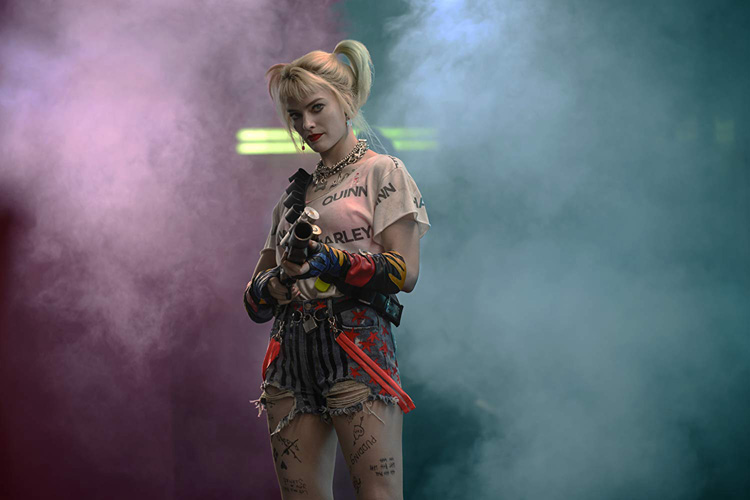Falling apart was the best thing that ever happened to the DC Extended Universe. After its attempt to emulate Marvel turned out miserably, DC Films shifted gears from connected narrative to isolated stories, giving filmmakers a little more room to play around with the material. This formula wasn’t a guaranteed success—by my estimation, Wonder Woman was the franchise’s only good movie in the 2010s—but it cut a path away from the dour self-seriousness that defined the earlier movies. Birds of Prey (and the Fantabulous Emancipation of One Harley Quinn), as you can tell from the title, is the furthest thing from self-serious.
Birds of Prey is technically a follow-up to Suicide Squad, but the movies are so incompatible that they might as well be strangers. Nobody knows this better than Harley Quinn herself: after being dumped by The Joker, Harley decides to strike out on her own, which mostly involves drinking herself silly at the most transparently villainous nightclub in Gotham. It’s there that she becomes acquainted with Roman Sionis, an eccentric gangster who keeps Harley around to maintain good standing with The Joker. When Sionis learns of their breakup, Harley’s last bastion of safety crumbles, and she’s forced to find a way to survive.
The movie’s first impression is one of anarchic glee. Suicide Squad was marketed as countercultural, what with its “good and bad are muddled in this messed up world!” posturing, but at its core, it was another mid-grade comic book movie with delusions of grandeur and mistimed quips. Its villains-as-protagonists conceit was more set dressing than moral subversion. Birds of Prey, on the other hand, abandons questions of morality and takes a hard left into violent silliness, which feels legitimately rebellious. Murdering innocent people? Fun protagonist behavior! Carving a child’s face off? Ooh, maybe a step too far, that’s antagonist behavior. Birds of Prey pays no attention to real-world ethics and it’s all the better escapism for it.
The movie’s genius is how specific its tonal anarchy is. The character of Harley Quinn is the thesis of the direction, costume design, cinematography, editing, color palette, sense of humor, you name it. Each artistic decision is filtered through Harley’s bubbly, frenetic brain, as if she were behind the camera as well as in front of it. If technical choices were clothing, director Cathy Yan would be cosplaying as Harley Quinn: she does anything she can to keep the party going, maintaining kinetic energy with unbroken takes, match cuts, and crash zooms, staring wild-eyed but clear-eyed at deadly acrobatics and zany set pieces. She knows how to rein it in during downtime, too—unlike another bird-related movie with a long, parenthetical subtitle, Birds of Prey dispenses its flair in bursts, giving us periodic sugar rushes without an exhausting sugar crash.
Not since Harley’s introduction in Batman: The Animated Series has a DC property understood the character this well. The R-rating lets her be crass, brutal, and politically brash; the screenplay gives her agency and intelligence (she has a PhD, dammit!); and the lack of moral rationalization lets her be a straight up terrible person. The heroines that make up the Birds of Prey, though, get short shrift in comparison.
Birds of Prey’s structure, unlike its style, isn’t hyper-focused on Harley Quinn, and to its detriment. Whenever Harley’s narration interrupts her own story to introduce the Birds of Prey, their origin story interrupts a central narrative, because the movie’s too busy to allow for a true ensemble. A lot is going on, and not all of it’s vital: the MacGuffin, a priceless diamond that Harley has and others want, nullifies the need for a villain, and the villain’s hatred for Harley nullifies the need for a MacGuffin. Birds of Prey is duty-bound to a comic book framework it doesn’t need.
And yet despite that, the fun reigns loud and proud, because nobody’s taking it that seriously. Margot Robbie enjoys applying prestigious acting to outlandish circumstances—she makes crying over a dropped sandwich look like an awards show clip reel segment—and Ewan McGregor, ever the consummate performer, reaches Batman Returns levels of cheesy darkness. His little expressions of disgust at uncleanliness are hilariously droll.
It’s fitting that the misogynistic antagonist is perturbed by grime. The women of Birds of Prey are dirty, bloody, gross and fallible; women neither tokenized nor justified. They enjoy a freedom that male filmmakers rarely offer to women in the genre: the right to be repellant and offensive.
★★★½ (3.5/5)




